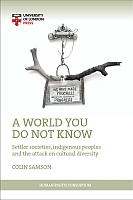A World You Do Not Know
Settler Societies, Indigenous Peoples and the Attack on Cultural Diversity
Abstract
A World You Do Not Know explores the wilful ignorance demonstrated by North America’s settlers in establishing their societies on lands already occupied by indigenous nations. Using the Innu of Labrador-Quebec as one powerful contemporary example, Colin Samson shows how the processes of displacement and assimilation today resemble those of the 19th century as the state and corporations scramble for Innu lands. While nation building, capitalism and industrialisation are shown to have undermined indigenous peoples’ wellbeing, the values that guide societies like the Innu are very much alive. The book ends by showcasing how ideas and land-based activities of indigenous groups in Canada and the US are being maintained and recast as ways to address the attack on cultural diversity and move forward to more positive futures.; This is a thoughtful book, highlighting the arrogance with which we approach indigenous ways of knowing and being, while also highlighting the continued resistance of indigenous peoples to western colonisation. -David MacDonald, Professor of Political Science, University of Guelph ; A World You Do Not Know explores the wilful ignorance demonstrated by NorthAmerica’s settlers in establishing their societies on lands already occupied by indigenous nations. Using the Innu of Labrador-Quebec as one powerful contemporary example, Colin Samson shows how the processes of displacement and assimilation today resemble those of the 19th century as the state and corporations scramble for Innu lands. While nation building, capitalism and industrialisation are shown to have undermined indigenous peoples’ wellbeing, the values that guide societies like the Innu are very much alive. The book ends by showcasing how ideas and land-based activities of indigenous groups in Canada and the US are being maintained and recast as ways to address the attack on cultural diversity and move forward to more positive futures.


 Download
Download